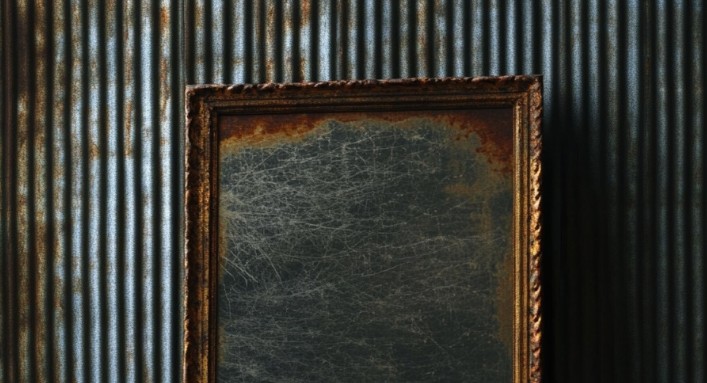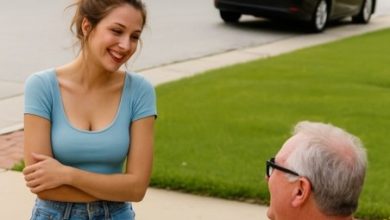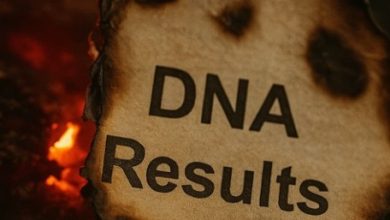Three Heart-Wrenching Stories About Inheritance, Envy, and Genuine Worth

When legacies arrive, they rarely feel like gifts.
They show up wrapped in hush and heartache, passed from one set of hands to another while the people left behind wipe tears and sign papers. Meant as a last hug, an inheritance can instead tear families open, pulling out old jealousies, untold truths, and choices nobody is ready to face.
The three tales below prove that opening a will often opens much more. One woman finds treasure behind a closet mirror, another unpacks a chess set that changes her future, and a daughter learns her mother’s final condition for keeping their home. All of them discover that what you receive matters less than who you become after receiving it. Keep reading—and decide for yourself what counts as real wealth.
1. Grandma Left Me a Run-Down Farmhouse, but What Hid Behind the Mirror Was the Real Gift
The lawyer’s office smelled like old coffee, worn leather, and secrets locked away too long. I sat straight in an upright chair, fingers laced tight, knees glued together. My sister, Claire, dabbed fake tears with an expensive silk handkerchief, acting as if grief were a talent show.
The lawyer coughed, papers rustling.
“To Claire, my youngest grandchild, I leave five hundred thousand dollars in cash.”
Claire’s hand flew to her chest. She gasped—the soft, practiced sound someone makes when being handed a crown. I stared past her at dusty books, jaw clenched so hard my teeth ached.
Then he said my name.
“To Abigail, my eldest, I grant the farmhouse on Maple Ridge, with every duty that comes with it.”
No cheers. No warm smiles. Only a heavy silence that pressed on my lungs. Claire tipped toward me and whispered, “You always loved that place, right?” as if she hadn’t spent those same years lounging in spas and rooftop bars while I sat by Grandma’s sick bed fighting insurance hotlines.
Claire got the money. I got the mess.
Back at the Farm
That same afternoon I drove alone up the gravel lane, stones pinging the car’s frame like tiny warnings. The white-painted house looked smaller than in childhood memories, boards sagging, paint peeling like sunburned skin. Still, I exhaled and spoke aloud, “Well, you’re mine now.”
The place seemed to breathe back, tired but hopeful. For days I returned with scrub brushes, hammers, and lists that never ended. One chilly evening, I paused in an upstairs room. A tall, dusty mirror leaned against the wall. As I wiped it clean, my cloth slipped over a thin metal tab hidden in the frame. Curious, I tugged. The mirror swung open with a groan, revealing a narrow space only big enough for one object.
Inside, taped to the wood, waited a small envelope. My nickname, “Abby,” danced across it in Grandma’s tidy script. Hands shaking, I opened it.
“Some things are worth more than money. I knew you’d understand. This house needs caring hands, so it needs you.
Love forever, Grandma.”
I almost laughed—a hollow sound. Claire was probably sipping fancy coffee high above the city while I scraped mold off windowsills, and this was my prize? Yet I folded the note carefully and placed it in my pocket. Grandma believed in me; that was reason enough to try.
A Stranger with a Suit and an Offer
A week later, golden afternoon sun painted the porch where I balanced a paintbrush in one hand, coffee mug in the other. A sleek black sedan rolled up the drive. Out stepped a silver-haired man in a suit that cost more than my car.
“You must be Abigail,” he said with a polite, unreadable smile. “I’m Henry, your grandmother’s friend. If this land ever became yours, she asked me to offer you one million dollars, in cash.”
My heart stumbled. A million? He surveyed the fresh paint, the shaky barn, the half-mended fence. “You’ve done good work. She’d be pleased.” I managed, “I need time.” He nodded. “Don’t wait too long.”
That night Claire showed up glowing with excitement. “Take the deal,” she urged. “Sell, split the money. It’s crazy not to.” I stared beyond her to fields rustling under a soft wind, and Grandma’s words echoed: Some things are worth more than money.
Henry returned two days later. Before he could knock, I opened the door. “I’m not selling.”
A slow smile crept across his face. “She’d hoped you’d say that.”
I frowned. “So it was a test?”
“In a sense,” he said. “Now we talk about building something better—together.”
He brought an architect who loved reclaimed wood, a soil expert, and Linda the cheesemaker who treated milk like art. We fixed the barn, planted vegetables, strung lights across the porch. Soon laughter replaced echoes, and bread baked in the kitchen. Claire visited again—curious, then helpful, then happy. We never spoke of inheritance after that.
Grandma was right. Real riches are trust, love, and building with your own two hands. That worn farmhouse wasn’t the end of anything; it was the start of everything.
2. My Sister Got the House, I Got Dad’s Chessboard—But Its Secret Shattered the Family
“Life is chess,” Dad always told me. “Quiet people win because they see three moves ahead.” I groaned back then. At his funeral, I would have paid to hear him repeat it one last time.
I stayed silent through the ceremony, through neighbors’ casseroles, and through my half-sister Lara’s grand entrance in a coat worth more than the coffin. She sniffed the air. “Still smells like him,” she sighed, as if scent were an inconvenience.
We sat in the lawyer’s office, chairs too close. The will opened.
“To my daughter Lara, I leave the house and everything in it. She may not sell while its present resident remains.”
Lara’s face lit like fireworks. She didn’t glance at me, just soaked in victory. The lawyer continued:
“To my daughter Kate, I leave my chessboard and pieces.”
Lara chuckled. “A house for me, a hobby for you. Fits.”
I gathered the board, walked out, her laughter scraping my ears.
A Game in the Park
I ended up at the park with stone chess tables scarred by weather. I unpacked the board; fingers placed pieces by habit. Lara’s voice sliced the quiet. She slid into the opposite seat, moved a pawn without invitation.
She talked the whole game. “Just wood, Kate. Symbols. Nothing like a house.” Her knight landed; she announced checkmate and swept pieces off the board for emphasis.
On the ground, a rook rolled against my shoe—heavier than it should be. I shook it. Click. Not wood. Another piece rattled.
Lara caught my expression. Her eyes flashed. “Come for dinner tonight,” she said lightly. “Mother insists. Family time.” With Lara, invitations were always double-edged.
Pieces and Truth Break Open
That night she cooked—something she once called “peasant work.” Smiling, she served dishes while our mother watched, confused. I set the closed chessboard on the hall table. Lara’s smile twitched.
After midnight, I peeked from my room. Lara crouched over the board, knife in hand, cracking pieces and prying out tiny velvet bags. I stepped into the light. “So it wasn’t just wood.”
She straightened, jewels glinting in her palm. “He hid the real gift, and I found it.”
“No,” I said. “You broke it and discovered what I allowed you to find.”
She frowned. I produced a document. “Bank slip—real gems in a vault under my name. Safe.” From the board’s felt bottom I pulled a hidden envelope—Dad’s true will:
If honesty guides you, share and live in peace. If greed leads, every asset passes to Kate.
Lara’s hands shook. “You cheated.”
“I played smarter,” I replied, tucking the board under my arm.
I walked out, one last word floating behind me—“Checkmate.”
3. I Thought Mom’s House Was Mine, but Her Letter Gave Me 72 Hours and One Impossible Choice
People say a mother’s home is shelter. For me it was also where my little girl, Lily, took her first steps—and the refuge I retreated to each time my husband Jason’s temper or laziness grew too much. Outsiders called me lucky: free rent, Grandma help, supper on the table. They never saw me juggling nurse shifts, housekeeping, and parenting while Jason sank into the couch like wet sand.
One night I carried Mom her chamomile tea. The room smelled of ointment and fading days. “You need to leave him,” she whispered.
“Not now,” I begged.
“I don’t have much time,” she said. “I need to know you’ll be safe.”
I tried excuses—he was stressed, rough patch, gets better tomorrow. She only stared, love and fear mixing in her tired eyes.
Later I found Lily waiting outside school alone because Jason forgot again. “It’s okay, Mommy,” she said. “I knew you’d come.” My heart split.
Mom died the next morning, book still open on her lap. Grief swallowed everything. That evening, Jason asked, “So… the house? Any money?” I could only stare.
The Condition
At Mr. Callahan’s office I learned there was no standard will. Only a letter: Emma keeps the house if she files for divorce within three days. Otherwise it will be sold and funds go to charity.
I walked to the car, shaking. Jason waited. “She left nothing,” I lied. He cursed her but believed me.
That night he came home smelling of beer and unfamiliar perfume. “Maybe if you tried harder…” he sneered. Lily heard everything. She whispered, “Mommy, do you want me to marry someone like Daddy?” The question hit like lightning. I saw Mom’s worry, Lily’s hope, my own buried strength.
Next morning I told the lawyer, “Start the paperwork.” He slid forms forward; my hand didn’t tremble this time.
At home Jason sat scrolling on his phone. I placed divorce papers on the table. “It’s over.”
He laughed until he saw my face. Rage followed. “Where will I go?”
“Somewhere else.”
He packed, slammed doors, and left.
Silence filled the house—clean, wide, brave. Lily danced down the hall. I held her and whispered, “We’re okay.” Mom’s letter hadn’t only secured a roof; it pushed me to free myself.
Final Thoughts
Inheritances may come as houses, cash, or dusty games—but every bequest carries a question: What will you do with what you’re given? Abigail chose sweat and second chances over a million-dollar check. Kate chose wisdom over easy revenge. Emma chose freedom for herself and her daughter. Their rewards were sturdier than money: community, self-respect, and the chance to build brighter tomorrows.
If a sealed envelope ever lands in your hands, remember: the real treasure might not be on the paper. It might be the person you decide to become when you open it.



